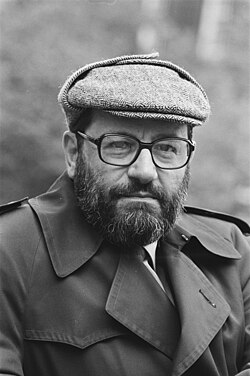Umberto Eco Quote
I returned to the courtyard and saw that the sun had grown weaker. Beautiful and clear as it had been, the morning (as the day approached the completion of its first half) was becoming damp and misty. Heavy clouds moved from the north and were invading the top of the mountain, covering it with a light brume. It seemed to be fog, and perhaps fog was also rising from the ground, but at that altitude it was difficult to distinguish the mists that rose from below and those that come down from above. It was becoming hard to discern the bulk of the more distant buildings.
Umberto Eco
I returned to the courtyard and saw that the sun had grown weaker. Beautiful and clear as it had been, the morning (as the day approached the completion of its first half) was becoming damp and misty. Heavy clouds moved from the north and were invading the top of the mountain, covering it with a light brume. It seemed to be fog, and perhaps fog was also rising from the ground, but at that altitude it was difficult to distinguish the mists that rose from below and those that come down from above. It was becoming hard to discern the bulk of the more distant buildings.
Related Quotes
About Umberto Eco
Umberto Eco (5 January 1932 – 19 February 2016) was an Italian medievalist, philosopher, semiotician, novelist, cultural critic, and political and social commentator. In English, he is best known for his popular 1980 novel The Name of the Rose, a historical mystery combining semiotics in fiction with biblical analysis, medieval studies and literary theory, as well as Foucault's Pendulum, his 1988 novel which touches on similar themes.
Eco wrote prolifically throughout his life, with his output including children's books, translations from French and English, in addition to a twice-monthly newspaper column "La Bustina di Minerva" (Minerva's Matchbook) in the magazine L'Espresso beginning in 1985, with his last column (a critical appraisal of the Romantic paintings of Francesco Hayez) appearing 27 January 2016. At the time of his death, he was an Emeritus professor at the University of Bologna, where he taught for much of his life. In the 21st century, he has continued to gain recognition for his 1995 essay "Ur-Fascism", where Eco lists fourteen general properties he believes comprise fascist ideologies.
Eco wrote prolifically throughout his life, with his output including children's books, translations from French and English, in addition to a twice-monthly newspaper column "La Bustina di Minerva" (Minerva's Matchbook) in the magazine L'Espresso beginning in 1985, with his last column (a critical appraisal of the Romantic paintings of Francesco Hayez) appearing 27 January 2016. At the time of his death, he was an Emeritus professor at the University of Bologna, where he taught for much of his life. In the 21st century, he has continued to gain recognition for his 1995 essay "Ur-Fascism", where Eco lists fourteen general properties he believes comprise fascist ideologies.
